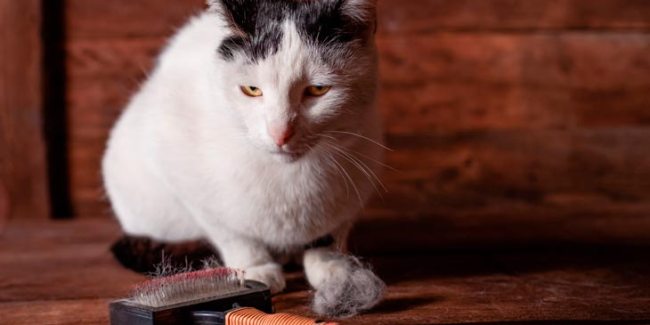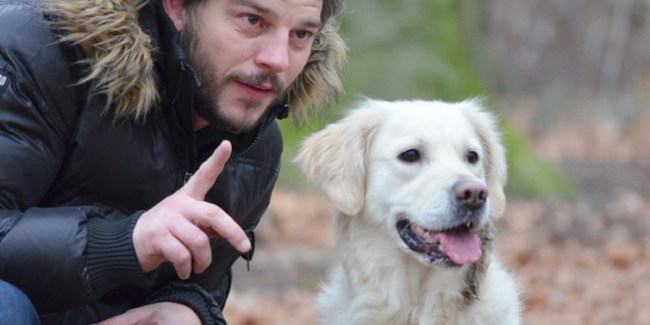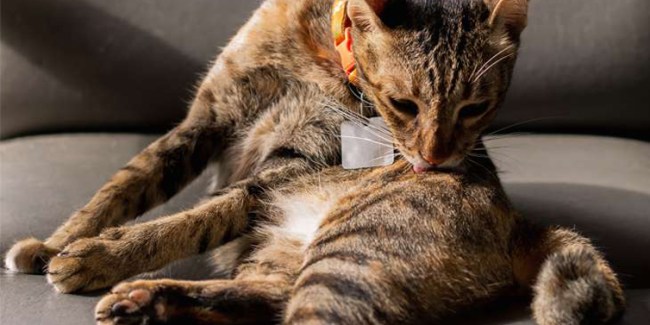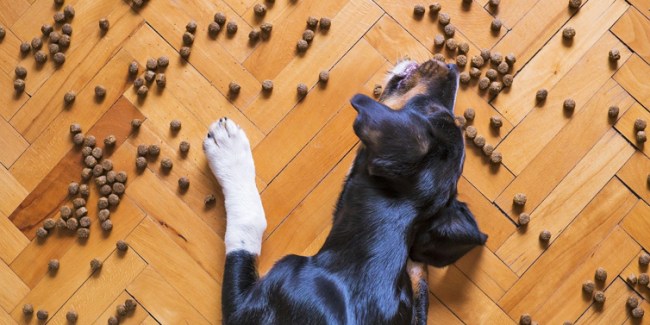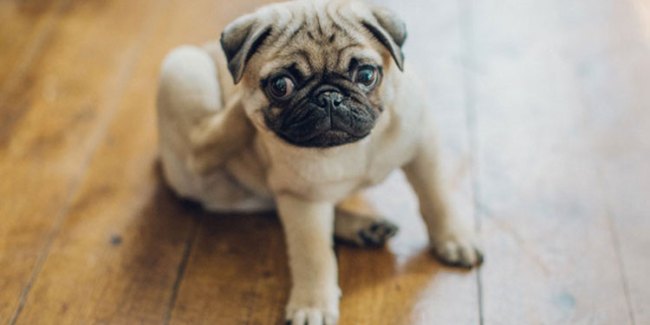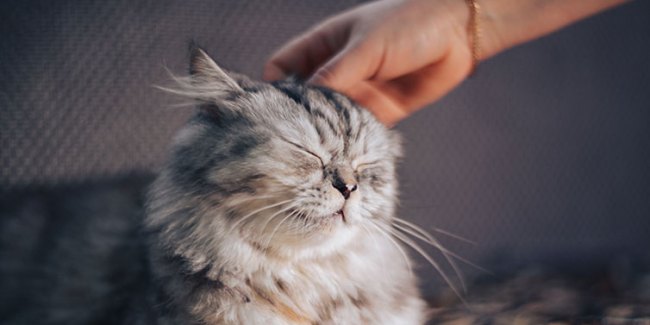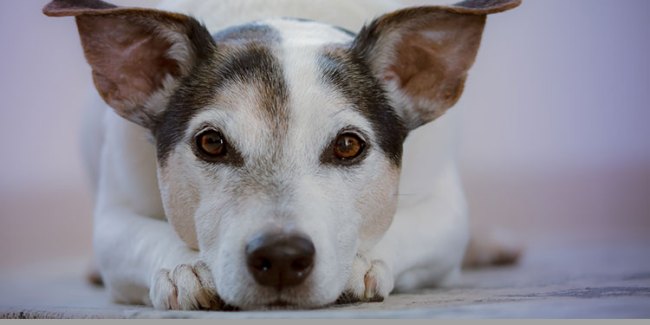Obesity in Cats
It is not always easy to determine whether your cat is overweight or not, because all breeds and body types are different.
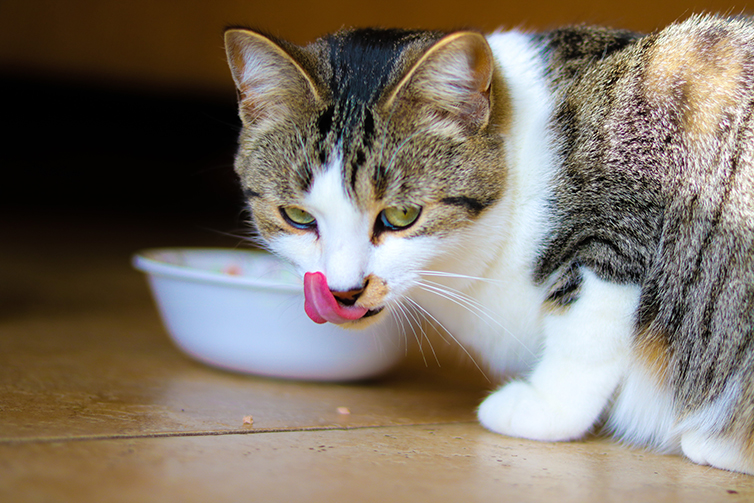
Risks of Obesity
Even if your cat is only moderately overweight, it can increase his/her chances of developing certain diseases such as:
- diabetes melitus
- joint diseases and osteoarthritis
- heart conditions
- bladder problems
- skin conditions
- hepatic lipidosis (If an overweight cat loses weight too quickly, he/she may develop this serious disease.)
Checking if your cat is obese
Determining whether a cat’s weight is healthy or if he/she is over or underweight, is based on the cat’s body condition. If you want to do this at home, follow these easy steps:
- Check the ribs
Feel along your cat’s ribcage with your fingertips. If you use your palms you won’t be able to feel through the fur. If you can feel the ribs easily, kitty’s weight is probably healthy. - Body Shape: bird’s eye view
Stand directly above your cat and look straight down. His/her body, if it is a healthy weight, should have an hour-glass shape with a ‘waist’. Without a ‘waist’ and a rounder shape, would indicate that kitty is probably overweight. - Body Shape: Side View
Looking from the side, if your cat’s ‘waist’ is sagging or if his/her tummy swings when walking, it is possible that your kitty is overweight. In a cat with a healthy weight, the bottom of his/her tummy should be higher than the ribcage. The tummy should not hang down or be level with the ribcage. - Behaviour Clues
Overweight cats usually dislike too much activity and may avoid interaction with humans because this requires them to exert themselves.
A Feline Weight-Loss Plan
Thebest way to go about this is to speak to your vet initially. You can’t just reduce the amount of food your cat has been getting because this could eventually cause malnutrition.
If cats lose weight too quickly, they can develop a serious liver disease called hepatic lipidosis, as mentioned above. Your cat’s meals must be properly planned for him/her to lose weight safely. Certain products may be recommended and the size and frequency of meals will need to be adjusted.
Ask your vet to help you to choose the best diet for Fat Cat, including treats which will not affect his/her weight loss plan. Cats, being carnivores, need meat in their diet to give them certain essential amino acids and vitamins. Humans and dogs can obtain their protein from other food sources.
To help your cat lose weight but maintain lean muscle, kitty should be on a specially-designed, balanced diet which is high in fibre, low in fat and moderately high in protein.

Meal size and frequency
Adult cats need fresh food once or twice a day. There are, however, healthy cats who eat more often. There are app-based ‘feeders’ available online – like the SureFeed Microchip Pet Feeder – if you are unsure about how much food your cat should be having. These ‘feeders’ track the frequency and amount of food your kitty eats.
Weigh-Ins
To keep track of weight loss, and to check that it is neither too fast or too excessive, your vet may suggest that you take your cat in for regular weigh-ins. You can, of course, weigh your cat at home. Here are two suggestions:
- Weigh your cat’s basket, then weigh your cat in the basket and subtract the first weight from the second.
- Weigh yourself on a scale and then weigh yourself holding the cat. subtract the first from the second weight.
Once your vet is happy with kitty’s weight and condition, a maintenance plan can be developed.
Exercise
Getting Fat Cat to be active will assist with weight loss and build muscles, and also be a good bonding tool. Here are some suggestions:
- Pull a toy on a string along, pausing occasionally. Your cat will stalk and pounce, simulating hunting behaviour.
- Encourage climbing and jumping by making an obstacle course.
- ‘Interactive Feeders’ or food puzzles, not only slow down feeding but also provide mental stimulation.
- Try playing ‘fetch’ with kitty. Yes, some cats will enjoy chasing a ball, particularly one containing a bell.
And finally:
It is never ‘too late’ to help Fat Cat to lose weight with a few easy changes and a controlled diet plan. This will result in a much healthier feline friend, who is less likely to develop the health problems facing an obese cat.
Good luck!
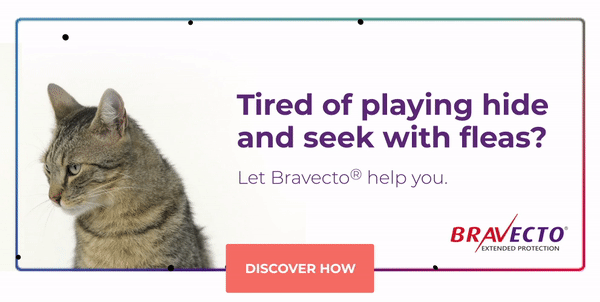
Subscribe to our Newsletter
Get to know your furry friend better! Sign up for all things dog- or cat-related.
The Hairy Facts about the dreaded hairball
12 April 2021
Help! My dog’s barking mad! Volume 2
12 April 2021
Your Itchy, Scratchy Cat – All About Cat Skin Problems
12 April 2021
The Dog’s Diet: A Bone of contention?
01 April 2021
Mango Fly Worms: How to Spot and Eliminate them
Posted on November 28,2019
Managing Mange And Mites In Your Dog
Posted on June 11,2018
Why Do Cats Purr and How? Learn What Your Cat Is Saying
Posted on October 14,2020
How to Get Rid of Ear Mites in Dogs
Posted on November 06,2019


